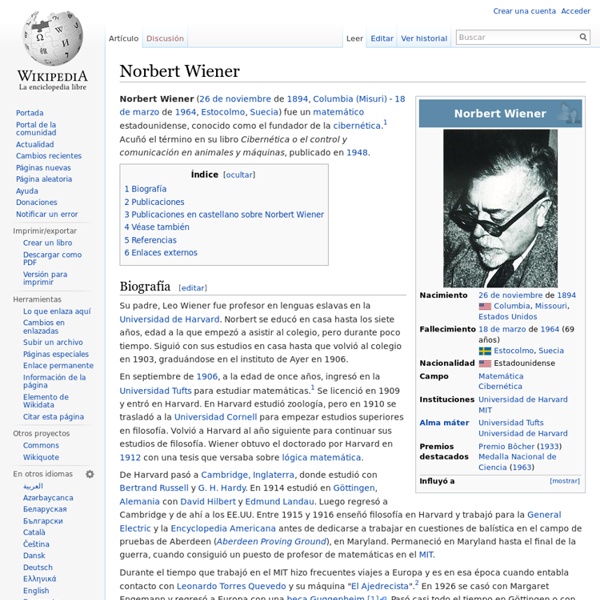Norbert Wiener
Norbert Wiener (26 de noviembre de 1894, Columbia (Misuri) - 18 de marzo de 1964, Estocolmo, Suecia) fue un matemático estadounidense, conocido como el fundador de la cibernética.[1] Acuñó el término en su libro Cibernética o el control y comunicación en animales y máquinas, publicado en 1948. Biografía[editar] Su padre, Leo Wiener fue profesor en lenguas eslavas en la Universidad de Harvard. Norbert se educó en casa hasta los siete años, edad a la que empezó a asistir al colegio, pero durante poco tiempo. Siguió con sus estudios en casa hasta que volvió al colegio en 1903, graduándose en el instituto de Ayer en 1906. En septiembre de 1906, a la edad de once años, ingresó en la Universidad Tufts para estudiar matemáticas.[1] Se licenció en 1909 y entró en Harvard. De Harvard pasó a Cambridge, Inglaterra, donde estudió con Bertrand Russell y G. Publicaciones[editar] Publicaciones en castellano sobre Norbert Wiener[editar] Steve J. Véase también[editar] Referencias[editar]
Laswell’s theory of communication |
7. Explain Laswell’s theory of communication. (10) The Lasswell Formula Please note: The Lasswell Formula is typical of what are often referred to as transmission models of communication. For criticisms of such models, you should consult the section on criticisms of transmission models. The sociologist, Harold Lasswell, tells us that in studying communication we should consider the elements in the graphic above. Lasswell was primarily concerned with mass communication and propaganda, so his model is intended to direct us to the kinds of research we need to conduct to answer his questions (‘control analysis’, ‘effects research’ and so on). Lasswell: Communicator Lasswell was primarily concerned with mass communication. How appropriate is the term communicator? Control analysis Because of the application of Lasswell’s Formula to the media, his question Who? who owns this newspaper? and so on. Can you see, though, how that sort of question can be applied to, say, interpersonal communication?
Hans-Georg Gadamer
Hans-Georg Gadamer (; German: [ˈɡaːdamɐ]; February 11, 1900 – March 13, 2002) was a German philosopher of the continental tradition, best known for his 1960 magnum opus Truth and Method (Wahrheit und Methode) on hermeneutics. Life[edit] He later studied classics and philosophy in the University of Breslau under Richard Hönigswald, but soon moved back to the University of Marburg to study with the Neo-Kantian philosophers Paul Natorp (his doctoral thesis advisor) and Nicolai Hartmann. Shortly thereafter, Gadamer moved to Freiburg University and began studying with Martin Heidegger, who was then a promising young scholar who had not yet received a professorship. Gadamer habilitated in 1929 and spent most of the early 1930s lecturing in Marburg. In 1933 Gadamer signed the Vow of allegiance of the Professors of the German Universities and High-Schools to Adolf Hitler and the National Socialistic State. Work[edit] Philosophical hermeneutics and Truth and Method[edit] Other works[edit] Primary
Paul Watzlawick
Paul Watzlawick (July 25, 1921 – March 31, 2007) was an Austrian-American family therapist, psychologist, communications theorist, and philosopher. A theoretician in communication theory and radical constructivism, he commented in the fields of family therapy and general psychotherapy. Watzlawick believed that people create their own suffering in the very act of trying to fix their emotional problems. He was one of the most influential figures at the Mental Research Institute and lived and worked in Palo Alto, California. Life[edit] After he graduated from high school in 1939 in his hometown of Villach, Austria, Watzlawick studied philosophy and philology at the Università Ca' Foscari Venice and earned a doctor of philosophy degree in 1949. In 1960, Don. Work[edit] At the Mental Research Institute in Palo Alto, California Watzlawick followed in the footsteps of Gregory Bateson and the research team (Don D. Interactional view[edit] Five basic axioms[edit] Additional notions[edit] Legacy[edit]
Related:
Related:



